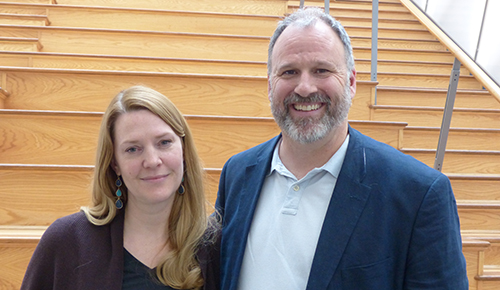
Mandi Newton and Bruce Wright are part of a team that will be bringing new changes in emergency departments to help children facing mental health issues.
Thanks to new funding, Mandi Newton and her team are hoping to change the way children are seen for mental health crises in emergency departments. The three year project will see new assessment tools and approaches to care being adopted by physicians and clinicians at the emergency departments at the Stollery Children's Hospital and the Alberta Children's Hospital.
Newton, associate professor in the Division of General and Community Pediatrics, and her co-principal investigator, Stephen Freedman, in Calgary received over $850,000 from the Partnership for Research and Innovation in the Health System, which is a partnership between Alberta Innovates and Alberta Health Services.
The Stollery emergency department sees about 4,600 cases presenting with mental health crises a year and it's progressively increased each year, says Bruce Wright, divisional director of Pediatric Emergency Medicine. "We have to best handle the increase in volumes. We will never turn anyone away. If we use the appropriate screening tools, then we can identify what a family needs and point them in the right direction so they get seen in a timely fashion."
"A key deficiency in our system right now is families don't know where to go for help or we haven't been able to identify how a service might best suit their preferences or needs with where they are at in the crisis. The hope is if we put these tools in place and we have those crucial conversations while we are doing the assessment, they may connect with the appropriate program more quickly," says Newton.
Project investigators consulted with families, youth and clinicians to determine what the approach to crisis care should be and how the new changes should be evaluated. Interest was directed toward the well-being of families and youth and family satisfaction of the services that they received. What's different about this project is that continuous evaluation will enable the emergency department to make changes to improve care, even before the end of the project. "We'll get constant feedback. We'll know what's happening. We'll hear from families. We'll hear from mental health clinicians. We can adapt it along the way - that's where the change management piece comes in," explains Wright.
"Basically, 100 percent of this is dependent on families and clinicians doing things differently. It's a more unique approach for a research project. Often you go in and study a situation and you come back out. We're proposing to continually improve the approach to care during the three years with the hope that the improvements will keep going beyond the tenure of this project," says Newton.
Newton, associate professor in the Division of General and Community Pediatrics, and her co-principal investigator, Stephen Freedman, in Calgary received over $850,000 from the Partnership for Research and Innovation in the Health System, which is a partnership between Alberta Innovates and Alberta Health Services.
The Stollery emergency department sees about 4,600 cases presenting with mental health crises a year and it's progressively increased each year, says Bruce Wright, divisional director of Pediatric Emergency Medicine. "We have to best handle the increase in volumes. We will never turn anyone away. If we use the appropriate screening tools, then we can identify what a family needs and point them in the right direction so they get seen in a timely fashion."
"A key deficiency in our system right now is families don't know where to go for help or we haven't been able to identify how a service might best suit their preferences or needs with where they are at in the crisis. The hope is if we put these tools in place and we have those crucial conversations while we are doing the assessment, they may connect with the appropriate program more quickly," says Newton.
Project investigators consulted with families, youth and clinicians to determine what the approach to crisis care should be and how the new changes should be evaluated. Interest was directed toward the well-being of families and youth and family satisfaction of the services that they received. What's different about this project is that continuous evaluation will enable the emergency department to make changes to improve care, even before the end of the project. "We'll get constant feedback. We'll know what's happening. We'll hear from families. We'll hear from mental health clinicians. We can adapt it along the way - that's where the change management piece comes in," explains Wright.
"Basically, 100 percent of this is dependent on families and clinicians doing things differently. It's a more unique approach for a research project. Often you go in and study a situation and you come back out. We're proposing to continually improve the approach to care during the three years with the hope that the improvements will keep going beyond the tenure of this project," says Newton.